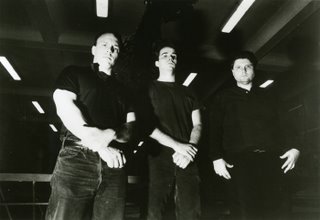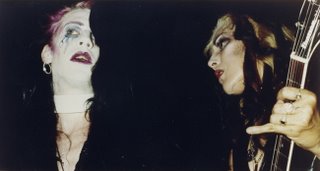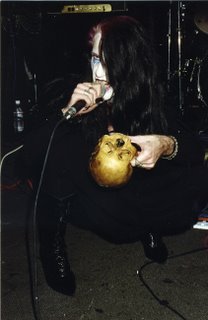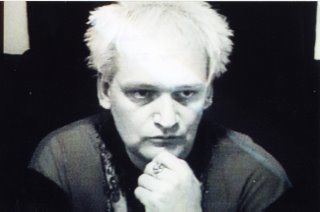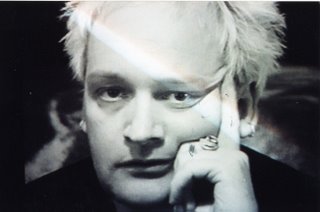Victims Family
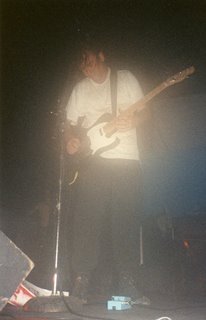
People seem to be at a loss for words when trying to accurately describe what it is that Victims Family sounds like. That's just fine with Victims Family, since they hate categorizations anyway. The easiest pigeonhole for them would be to call it punk jazz funk hardcore, because their music fuses distinguishable elements of sound from each of those genres and then they make it into something all their own. Victims Family now has four albums out since they got their start in 1984, and have been touring throughout the U.S. and Europe in the last few years. Those tours have built up a strong base of fans outside of Northern California and given the band quite a bit of exposure abroad. Recently Antocularis had the opportunity to talk with Victims Family backstage before a show about what they've been up to, their new album and tour, and what they will be doing in the near future.
----------
Interview with Ralph Spight, Larry Boothroyd, and Tim Solyan.
AC- Tell me about the early years of Victims Family.
RS- Victims Family formed in October of '84, as Larry and I were searching for a drummer. We would get together making songs and finally settled on Devon as our drummer, and began rehearsing in my studio apartment which was nothing more than some sheetrock. It was a very tiny place in a very residential neighborhood-
LB- It's been since bulldozed over-
RS- But I Digress. Let's see.....just started playing as many shows as we could, getting songs together, throwing out bad songs, started playing a lot of shows in San Francisco, and then in 1986 we hooked up with Ruth Schwartz at Mordam Records and did our first album Voltage and Violets. We did a tour in 1985 with just a demo tape. We just put out the demo and sent it around to some clubs all over the country.
LB- Basically just to get out of town.
RS- Yeah, kind of a little vacation.
AC- Did you offer this demo tape for sale at shows or attempt to distribute it?
RS- No, we didn't even sell the demo.....I don't know how we survived that tour. We had no merchandise at all, we got paid hardly anything, but we managed to survive that tour. It was pretty amazing. In 1987 we went on a big, long, horrible tour of the United States- three months long and filled with all manner of hideous disasters.
LB- The worst things you could imagine.
RS- All of the most horrible tour stories combined.
AC- What exactly were some of the things that went wrong?
RS- Engines exploding, equipment being ripped off-
LB- After the first show, we had to put a whole new engine in the van.....that should have been a clue right there. RS- We should have turned around then.
AC- How far did you get?
LB- We got the van the day before we had to go on tour-
RS- This could be a whole interview-
LB- This is something that has never been printed, this whole story.
RS- Do we want to go into this?
LB- No, it doesn't glorify us in any way.
AC- Well, what were some of the positive things that resulted from your '87 tour?
RS- We stayed together.
LB- It was important for us to finally get through a tour and meet people.
AC- Have you toured the States for White Bread Blues yet?
RS- No, not yet. That's coming up. The next tour that we're booking now starts on March 28th.
AC- Would you tell us about the tours you've completed up 'till now?
RS- '85 was the demo tour.....five weeks in America, Des Moines, Iowa and back. Then the '87 fuckin' hell tour of America-
LB- Three months, all the way up to Boston. Lived in Michigan for a while-
RS- '88 Europe tour, six weeks, 35 shows.
TS- It wasn't that many.
RS- Yeah, we had more days off last time than we did this time, and then last March-May we did the States again. That was only five weeks.
TS- Then we came back and went to Canada. Did a week up to Canada, recorded for a week, did another four shows coming back.
AC- Wherever you're going you try to stop in and play a few shows?
TS- Well, on the way to record we did-
RS- Because we recorded the album in Canada. We did Eugene, Seattle, Portland, Victoria, and then we did Seattle and Portland again on the way back. Then we just went to Europe for two months, October-November '90.
AC- Do you have more of a following in Europe compared to the U.S., after the tours the band has done there?
RS- Yeah. The whole "alternative" scene seems to be much more organized over there, and basically in Europe the welfare system is a lot better so people don't need to work at shitty jobs. There's no work for them anyway.
LB- And most of the clubs don't rely on the bar. They're more like youth centers.
RS- There is a lot more cooperation, a lot more squatted gigs. It's just much easier for them to do things. People over there aren't so worried about the "money" thing all the time.
AC- The Europeans seem to be open to a lot more.....at least that's what many American bands have told me.
RS- There seems to be more energy going toward it over there. In the U.S. there isn't much energy going into the whole alternative scene. There is only a handful of record labels-
LB- Or the arts in general.
RS- Also, there isn't such an antagonistic view of alternative, punk, hardcore culture over there. Here, if you walk down the street with blue hair you get accosted and killed almost. In Europe people could care less. They can't be bothered with other people. It's just a cultural difference. I enjoy playing the States because to crack the whole culture of America is very satisfying.
AC- How about your following outside of California? Has it increased in the recent years?
RS- Yeah, now. After our last tour of the States I think we really..... we had twelve different stickers and we put them up everywhere!
TS- There were people at shows we did back East, and they would come up to me and say, 'dude, I saw you guys four years ago! You were bad!' I was like.....'wait, that wasn't me!' People still remembered that far back, and it had gotten bigger. A lot of people had the records, and knew the songs here and there.
RS- It had been growing.
LB- Especially after the '87 tour. It was discouraging. We got lazy on stage, and it was totally our fault.
RS- Well, there were a variety of reasons why we did the tour. Money is a problem, and then fuckin' like Devon quit. There was the whole drummer thing.
AC- Was that a major setback for the band?
RS- Definitely was. It was definitely a setback, because I felt when we recorded, "Things I Hate To Admit" we had jelled and had so much chemistry. It was a peak, and sad to see it explode in such a way.
AC- When you came back with "White Bread Blues," what was recording together like compared to the "Things I Hate To Admit" sessions?
LB- That was the best recording we've done. It's just been the whole experience of it.
RS- Well, we were able to spend more time with it. For one thing.....it wasn't leisurely by any means, but more leisurely than the first two sessions, so that helped.
LB- And the engineer, John, is way more familiar (obviously), from where we're coming from-
RS- The producer god.
AC- How did this relationship come about between a member of NoMeansNo (John) and Victims Family?
RS- We're lovers. Let's see.....we first met and saw NoMeansNo in '86 or '87- maybe '85. It was a long time ago.
AC- Were you playing a show with NoMeansNo when you met?
RS- Yeah, it was their first tour of the States, and we both just played a pizza parlor in Oakland..... we were completely blown away by those guys.
LB- There was maybe fifty people there to see the show, and we didn't know who NoMeansNo were.
AC- At the time was their tour for Sex Mad?
RS- This was before Sex Mad.
LB- It was for You Kill Me. We were like 'yeah, some band called NoMeansNo is playing- whatever!' So we play, get off stage, walk outside and come back to see them play. It was like @!#$*. Andy didn't even have his guitar, He was just bouncing around on stage and singing. I think they only played three songs. So, we've played with them over the years and got to know them a little bit better. We know that John and Craig and Cecil are really good at making records and doing live sound. John, as well as being a really natural musician is also just a whiz in the studio.
TS- It's like he was born with a silver 24 track in his mouth.
AC- So he basically engineered the whole album?
RS- He produced it, and did a lot of the engineering with Cecil English-
TS- And Craig.
RS- Craig lent his ears to the whole thing.
AC- Are NoMeansNo and Victims Family mutual fans of each other's work?
RS- Basically, yeah. It's culminating all in the fact that we're doing a bunch of shows with them coming up in March and April across the States.
AC- Do you see any further collaboration with No Means No in the future?
RS- I don't know. It's like if they're up for it we'd love to do something. We're going to do those live shows-
TS- And John is our producer now.
RS- John wants to produce our next album too.
AC- Have you guys talked about recording together on an album?
RS- No, there hasn't been talk of that-
AC- Would you do it?
RS- Sure!
TS- It's not out of the question.
RS- If everybody could find the time.
AC- Is time a problem for Victims Family when working on projects?
RS- There never seems to be enough to do the creative end of it, especially when you're involved in doing shows, and we do all our business ourselves too.
AC- You take care of your own management?
RS- Yeah. It's just us. There's no big management behind us.
LB- Plus we've been building a new studio which has been taking up all our spare time lately, and booking this tour, buying a van-
RS- It's been really crazy.
AC- Well, it must feel good to be in complete control over all aspects of the band.
RS- Definitely. The one thing that we don't control is running the record label. We stopped short of putting our own shit out. Running a label is like a 28 hour a day job. I couldn't do that and be in my own band and do my own management.....we couldn't do all that. We're very lucky.
AC- Is Victims Family happy with Mordam records?
RS- Yes.
AC- Are you going to stay with them?
RS- If they want to keep doing it. We're the only band on Mordam now.
TS- We don't have any plans to shop around for something bigger.
AC- Now that White Bread Blues is out, are you starting to think about what your next album will be like?
RS- Yeah, I'm thinking about that constantly. I've been trying to write, and I just haven't found the use yet.
TS- We haven't got any new songs because we haven't had time to write.
RS- I stayed in Europe for another month after the tour, traveling around with my girlfriend. These guys-
TS- Came home and drank beer for two months.
RS- We didn't have a place to rehearse, so we finally got the studio together. We've been soundproofing the studio for weeks now.
AC- How does the Victims Family song writing process work?
RS- There's usually an idea that someone has, and for the most part it's pretty much a range..... there isn't a whole lot of, 'I've got this riff, and I don't know what to do with it 'kinda thing.
LB- There used to be more of that though. In the beginning, we would just start making noise and at the same time make songs out of it.
AC- Does it take a long time for you to write a song and be satisfied with it?
RS- Well, you can write a song and it can sit for a long time because you think it's shit, but you try it with the band anyway. Sometimes I write songs in five minutes..... sometimes three months. Generally I tend to think that the five minute songs are a lot better than the three month songs- the inspiration of it all.
AC- Do you find yourselves tossing a lot of songs?
RS- Yeah.
LB- But we do recycle. We will take a piece from a song from three years ago and re-work it into a new song.
AC- People seem to have a hard time with trying to identify what it is that Victims Family sounds like-
RS- Good! We're glad to have our music defy description. That's all right with us. I am always at a loss for words when people ask 'what does your band sound like?' It's like..... read the book! There's a certain minimalism in the way that we do things. We try not to overplay things. I know that may be hard for a lot of people to believe, but when people really take it apart and listen to it, they will find that we try to be spacious.
TS- Once we come across something that's really cool we don't just sit there and try to write a couple songs just like it. One of us may play something that's totally bad, and if you can remember it let's try and do something with it.
RS- One of the things that's really hard about trying to write new songs in the frame of reference of being stuck in these songs right now..... this whole group of songs that we're playing live right now is that you're consciously influenced by the songs that you play all the time. So, it's hard to break away from it and work on something new. It's so easy to fall into the same kind of riffs, and same kinds of things you're doing all the time. You don't want to write the same kinds of shit over and over again.
AC- Do you think that White Bread Blues would have been entirely different if it had been recorded with your old drummer Devon?
RS- Yes. I don't think it would have been White Bread Blues, because White Bread Blues is really the culmination of going through-
TS- It's really weird because I worked for Victims Family for a couple years before I was even in the band, and Devon was my ultimate drummer who I thought, 'I gotta be just like that' or the only drummer I was ever really inspired by. It never really showed until I joined the band and realized I could play all these songs. It was strange because I watched him play these songs for two years, and it was like in my brain or something. It really went smooth..... we started writing songs and it just came out.
RS- Also, if we'd had Devon still, White Bread Blues would have been an album sooner, but it's cool that we had to go through all the changes of losing Devon, then having Eric Strand as the drummer, and having that not work out. The whole difficulty of getting over the break-up of the original unit contributed to our creative process.
AC- Well, is there any last minute things that Victims Family would like to say to its fans?
TS- We're not a jazz-core band, we drink a lot of beer, we don't do drugs, we're not supporting the war, and heck! we're coming to your town soon.
----------
This interview originally appeared in Antocularis issue #1, August 1992. For more information about Victims Family visit http://www.victimsfamily.com/ and http://www2.arnes.si/~suduvido/vf/victimsf.htm
